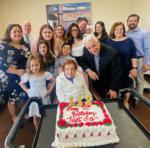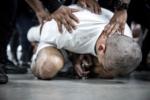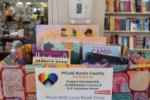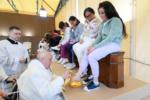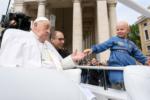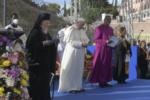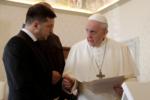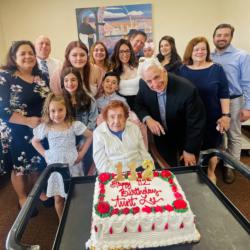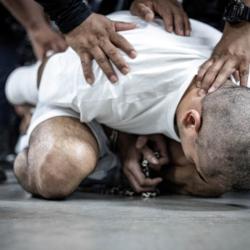'A powerful legacy and witness'
(Following is a transcript of the homily delivered by Archbishop Richard G. Henning at a special memorial Mass for Pope Francis celebrated April 23, 2025 at St. Theresa of Avila Church in West Roxbury.)
So, when we planned this memorial Mass, I hadn't yet looked at the readings for the day. But I was genuinely delighted when I did. They are such beautiful readings for what we do here this evening in remembering and commending our Holy Father to God. I have a particular affection for the Acts of the Apostles, and a particular affection for that scene -- the one that we have heard this evening -- where Peter encounters the lame beggar at the beautiful gate of the temple. And he says those amazing words to the man: "I don't have silver or gold to give you, but I have this: In the name of Jesus Christ, rise and walk."
It is such a powerful moment in the Acts of the Apostles for a number of reasons. One is that it tells us that the ministry of Jesus -- his ministry of reconciliation and healing -- continues beyond his earthly work on those dusty roads of Galilee, and that now that work occurs with the partnership of the church, of that new family of faith. They are not themselves healing and reconciling; they're doing so in the name of Jesus Christ, by his power, by his spirit. So that alone is something wonderful to behold: the nature of our call as disciples of the Lord Jesus in every age to keep doing his work united to him.
There's another aspect of this story that strikes me, and that's the kind of beauty that it is Peter who is saying these words, announcing this miracle and grace of the Lord. Because remember, it was not long before that Peter was paralyzed with fear. And yet now, he is one who proclaims boldly, openly, the truth of Jesus Christ and does mighty works in his name. And so you can say, in a very real sense, Peter himself has been told to rise and to walk. Because that loving mercy of Jesus, that gaze with which Jesus looked across the courtyard of the high priest and saw Peter pierced Peter to the heart and changed him.
And not only Peter, this is true of most of the disciples. As we hear tonight in the story of the road to Emmaus and in so many other accounts of the appearances of Jesus after his resurrection, what do we see? We see confusion, a lack of faith. Fundamentally, we see fear. These men and women who had hope in Jesus, who imagined that in his ministry God was at work, lost themselves in fear when the terrible events of the passion came upon them. They feared that they were wrong. They feared that, in fact, Jesus was now defeated. They feared for their lives and physical safety. And in their fear, they were lost. But the Lord Jesus, in coming to them and in conferring upon them the gift of the spirit, he opens up their eyes to the truth of who he has been all along. He banishes their fear.
And so the Acts of the Apostles uses a particular word over and over again to describe this early church and these first disciples. It speaks of them as bold and open in their proclamation. Now they know the truth that Jesus is, in fact, the son of God. Now they know the truth that God's grace and mercy is power, more powerful even than death itself. Now they no longer fear even what others can do to them to harm them or kill them.
And when that fear is banished, when their eyes are opened as they were in the breaking of the bread in that beautiful Gospel passage, it changes them. It makes them those bold proclaimers. But it also turns them outwards towards others. And this is a truth of the human heart that we all know: when we are afraid, we lose our sense of compassion for others. Fear turns us in on ourselves. In some ways, it ignites those baser instincts of self-preservation. Fear kills mercy, love, solidarity. But when we as disciples of the Lord Jesus, like those first disciples, place our hope in Jesus Christ, we need no longer be afraid. The Gospel tells us 22 times, "Be not afraid."
For this very reason, the gift of the resurrection is meant to teach our hearts to banish fear so that we may love as we have been loved, so that we may be a people who proclaim the truth of Jesus and do his works of mercy, of healing and reconciliation. And indeed, generation after generation, we have done just that. Just look to the lives of the saints and you will see this miracle of Easter faith and joy on display in their lives. There is no saint who turned in on himself or herself. They all have turned outwards with compassion.
I was so moved by that first reading also because I think, in many ways, this encounter between Peter and the beggar at the gate tells us a great deal about our Peter, who is Francis. For he too did not have silver or gold. Francis lived a life of very great simplicity, even poverty. He could not fix the world's problems with money. He could not dominate the problems of the world or force people to be better or to stop fighting. But as the first Peter said, "I can do this: In the name of Jesus Christ, arise and walk. Be healed. Be reconciled. Be restored. Stand up."
This is what Francis has been teaching us, not just during his papacy but long before, as a priest of Jesus, as a disciple of the Lord. He has shown us this with his own personal living, with his preaching, and with his ministry as Holy Father. For what has he told us over and over again? Well, one thing is he told us the church is meant to be a field hospital where the lame and the sick come for that very healing made possible by the grace of Jesus. He told us at the very outset of his pontificate about the joy of the Gospel and how that joy inspires hope. He told us in another letter that we were to be "Fratelli tutti" -- brothers and sisters all. Over and over again, he has reminded us of our call as disciples of the Lord to place our hope in the Lord and turn outwards in service of one another, not out of obligation, but out of gratitude to God and rejoicing in the gift of his grace and his mercy.
People have been asking, "What is Francis's legacy?" And I think there you have it. It's that summons to compassion, especially in the midst of human suffering. For also like the prophets of old, Francis has continuously asked us to look at the world with new eyes, with those eyes of faith, and to perceive those who may be overlooked or left behind, who do not necessarily benefit from the workings of those in authority. He has asked us to be a "chiesa in uscita," a church that goes out. He has asked us to go to the "periferia," to the edges, to notice those who do not get noticed, to speak with and for those who have no voice.
It's a powerful legacy and witness, and one that I believe is very much linked to the truths that we have heard proclaimed in these readings from 2,000 years ago, of those first Christians also discovering the beauty of the Lord's grace and the power of his spirit, prepared to speak boldly and openly of hope, of joy, and the possibility of healing. We all know how desperately needed they all are in this world.
If I may share with you, on Easter Sunday, I had a beautiful experience of celebrating Mass at the cathedral in Boston. The full church, standing room only. The music was sublime. It was a beautiful liturgy giving glory to God and coming together as the communion of the church -- a beautiful moment of hope and joy. But I spent the afternoon in a place where there was somewhat more darkness. So I went from there over to Children's Hospital, and I had the blessing of visiting with families who could not go to church on Easter because their children were very ill. It was a remarkable few hours visiting those rooms. As you can imagine, it's certainly difficult to see when the young suffer from illness. It is just as difficult to see the fear and the agony in their parents who want nothing more than to protect and to love their children.
Makes me think of another aspect of what Pope Francis teaches us: that sometimes we don't have the words, but if nothing else, we can simply walk with people when they need it most. And this is not something we give to them; it's something we experience together. For when we're with those who are suffering, when we walk with them, when we share in their suffering, we are made more human, more capable of love and service to others. This too is a key element of the kind of compassion that our Holy Father has called us to, to that human dimension, person to person, particularly in a world where too much of what we do is before a screen. He wants us to see and know each other and find there that healing that comes from the Lord alone.
I'm grateful that you have come this evening to pray for our Holy Father and to remember his legacy. I'm grateful we do this together as the family of faith, just as others will do tomorrow and on Friday night. I'm grateful for all of that. But I know that each and every one of us comes here to this place with our own suffering and fears. And I ask that we listen to those words of Peter and remember the legacy of this other Peter: "In the name of Jesus Christ, rise and walk." Do not be afraid. Know that the one you thought was lost has been restored to life. And in this, find your hope, your purpose, your meaning. Feel in your heart the truth of the love which is poured out at this altar. See him in the breaking of the bread. And allow his spirit to make you a bold and open proclaimer of the truth of his love and the truth of his healing and merciful reconciliation.
- Archbishop Richard G. Henning is the Archbishop of Boston

